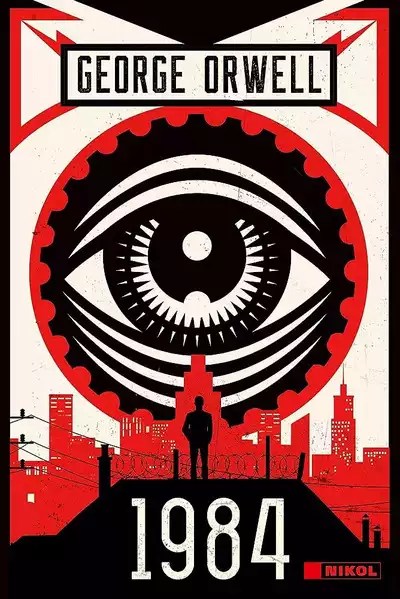By Prakhar Shukla
Dystopian literature often grapples with the conflict between the inner and outer worlds of individuals living under oppressive regimes. In these narratives, the external environment—characterised by surveillance, control, and manipulation—exerts significant influence on the individual’s psyche, shaping their beliefs, desires, and actions.
The inner world, in contrast, is often portrayed as the last refuge of autonomy, where rebellion, introspection, and the pursuit of truth take place. This tension between the external world of societal oppression and the internal world of personal rebellion and self-discovery serves as a powerful theme in many works.

In 1984, George Orwell portrays a terrifying vision of totalitarianism, where the boundaries between the inner and outer worlds are obliterated. The Party controls not only actions but thoughts, with surveillance technologies like telescreens ensuring constant observation. The Party manipulates reality through propaganda, historical revision, and “thoughtcrime,” even shaping language with Newspeak to limit expression and thought.
Winston Smith’s rebellion begins internally—through his private thoughts, his diary, and his illicit love affair with Julia. However, as the Party exerts its power through surveillance, propaganda, and torture, Winston’s inner world is gradually dismantled. The psychological abuse he endures at the Ministry of Love strips him of his sense of self, forcing him to betray his deepest convictions.
In the end, Winston’s internal resistance is crushed, and he succumbs to the Party’s version of reality, even professing love for Big Brother. His story is a chilling reminder of Foucault’s concept of “panopticism,” where the gaze of the state becomes internalised, and the individual no longer knows where external surveillance ends and internal consciousness begins. Winston’s defeat stands in stark contrast to Montag’s rebellion—a demonstration of how the outer world can not only reshape but utterly erase the inner world.

In Fahrenheit 451, Ray Bradbury explores a society that, unlike the overt surveillance state of 1984, operates through cultural suppression and the obliteration of intellectual freedom. The outer world of Fahrenheit 451 is defined by censorship, shallow entertainment, and a society bent on consumerism.
Firemen, as agents of control, burn books to eradicate dissenting thought. The lack of intellectual engagement drives people to immerse themselves in mindless distractions, such as the interactive “TV walls” that dominate their attention.
Montag, the protagonist, begins as a conformist but is awakened by his encounter with Clarisse McClellan. His rebellion starts as an internal journey, fuelled by curiosity and doubt about his purpose. Through reading and self-reflection, Montag resists the outer world’s oppressive conformity. His journey mirrors the existentialist struggle for authenticity, where the individual must escape societal constructs that strip them of agency.
Montag’s decision to leave symbolises a rejection of societal roles and an assertion of autonomy, echoing Sartre’s notion that “existence precedes essence.” Montag’s escape represents a triumph of individuality, as he chooses to shape his identity in defiance of a culture that denies him the freedom to do so.
In Suzanne Collins’ The Hunger Games, the outer world is marked by extreme social and economic disparity, with the Capitol exerting control over the districts through violence, poverty, and fear. This control is epitomised by the brutal spectacle of the Hunger Games, a tool of political oppression forcing individuals to fight for survival in a public arena. The Capitol’s surveillance and manipulation create an environment where personal autonomy is stifled, leaving little room for individuals to assert identity or rebel against the system.
Katniss Everdeen’s psychological journey is less about overt rebellion and more about reconciling the fractured identities imposed upon her: the dutiful sister, deadly Games participant, Mockingjay symbol, and reluctant leader. Her internal struggle pits survival instincts against the desire for authenticity and autonomy. Reflecting Sartre’s concept of “bad faith,” Katniss wrestles with external pressures that force her to deny her true self.
Unlike Winston, who succumbs to external control, Katniss channels her trauma into rebellion, using her pain and sense of injustice to fuel resistance. Her moments of defiance, such as her salute to Rue or her act of rebellion in the Games, are expressions of her inner self reclaiming agency. However, she constantly grapples with authenticity in a world that commodifies her image.
What’s striking in these narratives is the varied ways in which the inner and outer worlds collide and reshape each other. In Fahrenheit 451, 1984, and The Hunger Games, this collision is portrayed in distinct and thought-provoking ways, prompting deep philosophical questions about freedom, identity, and the nature of self. Montag’s journey represents the longing for self-actualisation, where his inner world is restored through knowledge, authenticity, and a rejection of external conformity. In contrast, Winston’s plight exemplifies the terrifying power of totalitarianism to obliterate the individual’s inner world, where external forces erase his ability to think freely. Katniss, meanwhile, faces a more complex path, as she struggles to maintain her humanity while being moulded by external demands. Her inner world remains fractured, yet her rebellion reshapes the outer world, raising questions about the role of trauma in personal identity and resistance.
These novels not only explore the consequences of the clash between inner and outer worlds but also offer profound insights into the human condition. They ask us to consider what happens when the state, society, or external pressures invade the sanctum of our consciousness. Do we retain our sense of self, or do we become reflections of the external forces shaping us?
The survival of the inner world in each narrative hinges on the individual’s capacity—however fragile—to resist, adapt, or break under external forces, posing timeless questions about freedom, identity, and the boundaries of self in a world bent on control.
Support Our Journalism
The global Indian Diaspora and Australia’s multicultural communities need fair, non-hyphenated, and questioning journalism, packed with on-ground reporting. The Australia Today—with exceptional reporters, columnists, and editors—is doing just that. Sustaining this requires support from wonderful readers like you.
Whether you live in Australia, the United Kingdom, Canada, the United States of America, or India you can take a paid subscription by clicking Patreon

